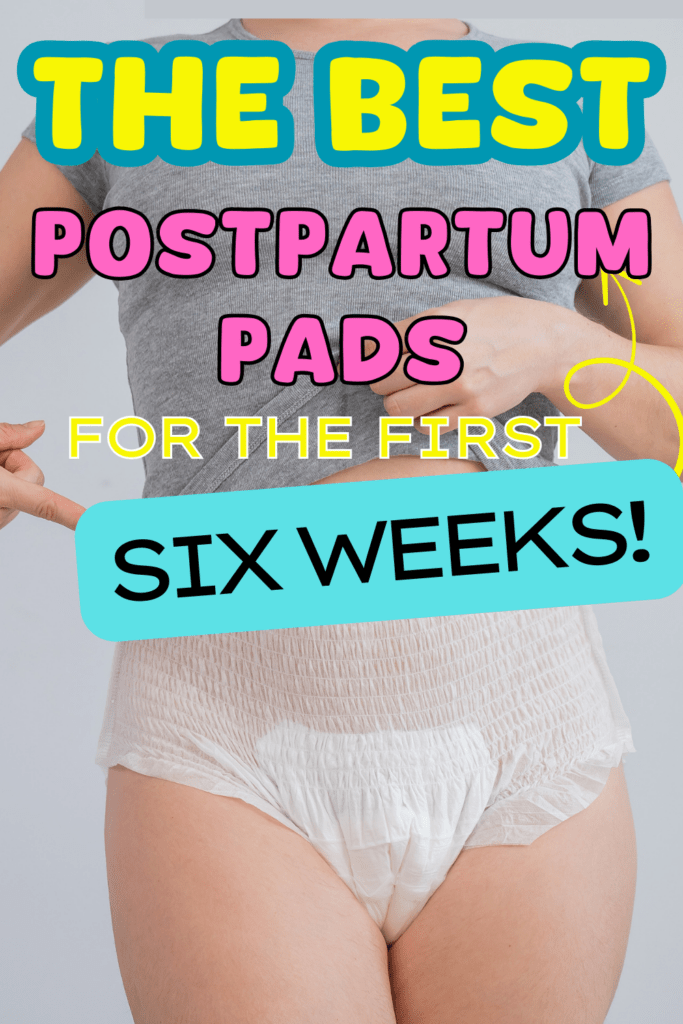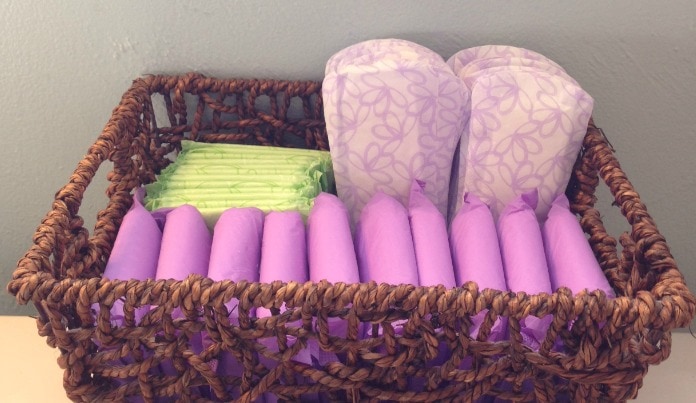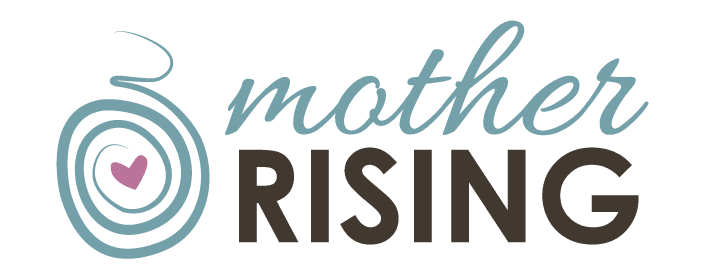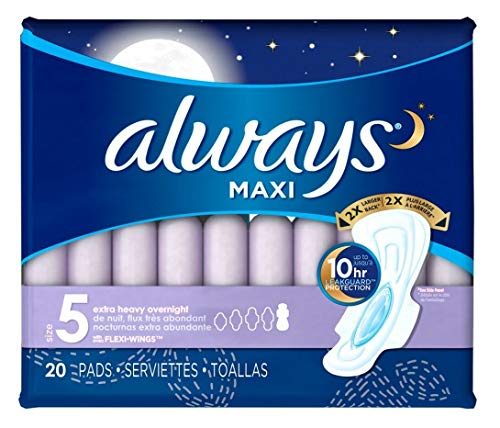Choose the best postpartum pads for the first six weeks after birth. Plan for heavy bleeding at first, and continually less for the remaining 3-5 weeks. In this post we discuss what to expect for postpartum bleeding and what pads to buy for each stage. Let’s get started!
TIP: For a quick shopping list for postpartum pads, scroll all the way to the bottom. 🙂
On This Page
10 minute read
↓Tips for Postpartum Bleeding and Recovery
↓Week 1, Part 1: Maximum Absorbency Adult Diapers
↓Cold for Bruising, Pain, and Swelling
↓Mesh Panties + Maternity Pads
↓Week 1, Part 2: Extra Heavy Flow Overnight Pads
↓Week 2-4: Regular Pads
↓Week 3-6: Panty Liners
↓Organic/Environmentally Friendly Options
↓The Pros and Cons of Cloth Pads
↓Other Postpartum Supplies to Buy
↓Postpartum Pads Shopping List

Tips for Postpartum Bleeding and Recovery
No matter what kind of birth you have – vaginal, cesarean, medicated, unmedicated, etc. – bleeding and/or spotting for a good portion of the first six weeks postpartum is pretty standard. After birth the uterus is tender and healing from a large wound where the placenta detached during the third stage of labor. This wound is where the blood comes from.
Postpartum cramps are normal and the body’s way of preventing hemorrhaging. By contracting down (cramping), it prevents the wound from bleeding too much.
- It’s important to pay attention to the amount of bleeding. Sometimes after doing too much in one day, bleeding will increase. This is the body’s way of saying “slow down!”. Listen to the body, it is wise.
- A few days after birth, you should not be soaking a pad quickly (within an hour). Contact your care provider if this is happening.
- Golf ball sized clots can be normal. Keep in communication with care provider to make sure clots are within normal range.
- There should be no foul smell coming from the vagina, on the pad, or in the blood. Contact your care provider if you think this is happening. This is an indication of infection.
- Change pads 2-3 times per day, or more often as needed.
- If applicable, choose a pad with minimal top weaving to maintain the integrity of stitches if applicable. The best postpartum pads for stitches do not have top weaving!
- Don’t use tampons, menstrual cups, or take baths. Keeping things out of the vagina aids healing and prevents infection.
The Best Postpartum Pads for the First Six Weeks
Here are the best postpartum pads for the first six weeks after birth.
Week 1, Part 1: Maximum Absorbency Adult Diapers
In the first week or so, bleeding is heavy, especially the first couple of days. Postpartum diapers are the way to go! There’s no worry of leaking with an adult diaper. It’s so easy! When it comes to postpartum, I’m a big fan of easy.
My favorite adult diaper for postpartum is Amazon Basics postpartum underwear. They are soft and less bulky than the average adult diaper and super absorbent.
SHOPPING TIP: Buy 1-2 packs of 12 adult diapers for the first week. 18 adult diapers should be more than sufficient and you’ll likely have leftovers. Gift your leftovers to another mama due after you. She’ll be so appreciative!
Postpartum diapers are a wonderful solution to the heavy bleeding new moms experience right after giving birth. Adult diapers are easy to take on and off, and minimize any mess. But don't worry, most women stop using them after only a few days.
Cold for Bruising, Pain and Swelling
- An adult diaper makes using padsicles super simple. First put on the adult diaper, and then place the frozen pad in the adult diaper and you’re good to go! With an adult diaper there’s no worry of the padsicle melting and making a mess in the sheets.
- When the padsicle melts, or you need a new pad, simply throw the pad out and replace it while re-using the same adult diaper. There’s need for a new adult diaper unless it has become soiled.
- If padsicles aren’t for you, many parents love these reusable ice packs made just for postpartum.
- If you need something even easier, try these disposable icepacks that work amazingly well!
Mesh Panties + Maternity Pads
Many parents rave about mesh panties coupled with the big, bulky maternity pads. Personally, I wasn’t a fan. I found the pad to slip all over the place, and because it didn’t have wings I leaked on the sheets! No, thank you.
I highly recommend using adult diapers in the beginning in lieu of the mesh panties. I have a hunch that if parents had both adult diapers/postpartum underwear and mesh panties in the bathroom, the diapers would win in the end.
NOTE: Some parents that gave birth by cesarean do prefer the mesh panties over the adult diapers because there’s less pressure on the incision site. That makes sense!
Week 1, Part 2: Extra Heavy Flow Overnight Pads
After a few days adult diapers become overkill as bleeding has slowed considerably. Congratulations! Your body is healing and you are ready to graduate to a heavy flow pad!
I love the Always Maxi “purple pads” which are their overnight extra heavy flow pads. These are the big guns, but don’t feel too big or bulky when wearing them. (You can make padsicles with these pads.)
SHOPPING TIP: Buy two packs of 20 “purple pads”. 40 overnight extra heavy flow pads should be more than sufficient. If you have any leftovers, gift them to another mama due after you. This is how you make mom friends!
These are the pads to use during the first week after birth, during postpartum recovery. They are absorbent without feeling too big, and have wings for extra protection. These are also great pads to use when making padsicles.
Week 2-4: Regular pads
After a week or so of wearing heavy flow pads, you’ll be ready to wear a regular sized pad and possibly something heavier for nighttime. Good job! Your body is continuing to heal!
- For daytime I recommend Always Ultra Thin Pads for Daytime.
- For nighttime I recommend Always Ultra Thin Pads for Overnight.
These are the pads I recommend for week 2-4 after birth for postpartum recovery at night.
SHOPPING TIP: Buy one pack each of the Always Ultra Thin Daytime and Always Ultra Thin Overnight pads. Keep any extras for when you get your first postpartum period. You’ll need them!

Week 3 – 6: Panty Liners
For the remainder of the six week period of time following birth, unless you’re pushing the body too hard, you’ll likely only see brown spotting. This is the perfect opportunity for panty liners. Always makes a pantyliner that is individually wrapped, which is helpful when on the go and in a diaper bag. I like easy!
SHOPPING TIP: One box of pantyliners will do. Be sure they are unscented.
Organic/Environmentally Friendly Options
If conventional pads aren’t for you, but cloth pads don’t spark joy either, you may be interested in a more natural postpartum pad with an organic cotton cover, perfect for sensitive skin.
Natracare Maternity Pads
Natracare’s pads are great for that first week with or without an adult diaper.
- Extra soft long and breathable
- Comfortably padded
- 100% plastic free
- Biodegradable and compostable
- Chlorine free
Rael Pads
After the first week, Rael has some good options as bleeding slows down.
Wondering how many environmentally friendly postpartum pads to buy? I recommend:
- 1 pack of adult diapers for the first few days
- 2 packs of heavy flow/overnight postpartum pads during the first 1-2 weeks
- 1 pack of regular ultrathin pads for weeks 2-4
- 1 pack of ultrathin overnight pads for weeks 2-4
- 1 pack of panty liners for the remaining 4-6 weeks
The Pros and Cons of Cloth Pads
I know many of you are wondering about cloth pads. Let’s talk about the pros and cons of using these reusable pads after birth!
PROS
- Environmentally friendly
- Better for those with stitches (hopefully you don’t have stitches because you read my post about how to prevent tearing at birth!)
- Free of chemicals found in conventional postpartum pads
- Can be used long-term when postpartum cycles return
- Won’t run out (assuming washing is kept up with)
CONS
- More expensive upfront purchase
- Bulky
- Moves around in underwear (cloth pads don’t have adhesive)
- Needs to be washed
- Less socially acceptable
If you are accustomed to using cloth pads there’s no reason to think that they wouldn’t work for postpartum as well. Make sure to have a good stash of cloth pads with a heavy/overnight absorbency.
In the first few days when bleeding is heaviest, an adult diaper may still be the best way to go. It’s one less thing to think about, wash, and helps avoid leaks. When bleeding slows some, that’s a great time to begin using cloth.
How Many Cloth Pads to Buy?
The number of cloth pads to buy
- 10 heavy flow/overnight postpartum cloth pads for the first 1-2 weeks
- 10 regular flow postpartum cloth pads for weeks 2-4
- 5 light flow/cloth panty liners for the remaining 4-6 weeks
 Other Postpartum Supplies to Buy
Other Postpartum Supplies to Buy
Other than the postpartum pads described above, at least two other items should be purchased for postpartum.
1. Peri Bottle
A peri bottle is basically a portable bidet. Simply fill the peri bottle with warm water, and use it in lieu of or in addition to toilet paper for cleansing after using the toilet. A peri bottle is gentle on our tender lady bits. You could even fill it with a sitz bath tea for even more healing!
2. Ice Packs
After a vaginal delivery it is common to experience swelling and bruising. A simple, natural remedy for relief is an ice pack. For postpartum, buy either a reusable ice pack made just for postpartum or a box of disposable icepacks! (Or you could just use padsicles.)
Postpartum Survival Kit
If you’re interested in learning more about more products I’ve personally used for postpartum, head on over to my post about an all natural postpartum survival kit. In that post I discuss sprays, balms, homeopathic remedies, herbal remedies and much more!
Postpartum Pads Shopping List
Need a postpartum pad shopping list all in one place? You’re in luck!To recap, here are shopping lists for the best postpartum pads during the first six weeks:
Conventional Postpartum Maxi Pads
- 1-2 packs of adult diapers/postpartum underwear for the first few days
- 2 packs of Always Maxi “purple pads”
- 1 pack of Always Ultra Thin Pads for Daytime
- 1 pack of Always Ultra Thin Pads for Overnight
- One box of Always Individually Wrapped Pantyliners
Environmentally Friendly Postpartum Pads
- 1 pack of adult diapers for the first few days
- 2 packs of heavy flow/overnight postpartum pads during the first 1-2 weeks
- 1 pack of Seventh Generation regular ultrathin pads for weeks 2-4
- 1 pack of Seventh Generation ultrathin overnight pads for weeks 2-4
- 1 pack of panty liners for the remaining 4-6 weeks
Cloth Postpartum Pads
- 1 pack of adult diapers for the first few days
- 10 heavy flow/overnight postpartum cloth pads for the first 1-2 weeks
- 10 regular flow postpartum cloth pads for weeks 2-4
- 5 light flow/cloth panty liners for the remaining 4-6 weeks
Also, make sure to buy a peri bottle, disposable ice packs, or even specially made reusable postpartum ice packs!
Want More?
Use Mother Rising’s postpartum archives to learn more about the postpartum recovery!













Catie
Monday 22nd of November 2021
Please add a section of recommendations for women who have to be put on blood thinners for post-partum DVT or finish out a cycle of blood thinners in the six weeks following birth. It is so much harder because bleeding goes on for so much longer.
Or do a whole section on why women need to move around and get some basic exercise every day postpartum to prevent clotting, and how having been on birth control previously can create a higher risk for clotting postpartum. I wish someone would have told me. I'm just thankful I knew the signs to look for in clots so I recognized them early on.
Otherwise, great article.
Lindsey VanAlstyne
Wednesday 1st of December 2021
Sounds like you had something unexpected happen! Either way, good reminder. My high risk doctor always said one of the benefits for women birthing at home or a birth center was that these women were far more likely to be active during their postpartum recover, thus reducing the risk for blood clots. :)
Sunny
Thursday 18th of April 2019
I think Organic cotton is important during postpartum recovery especially!! I also used it. It is really soft and thick, so I don't have to worry about overflowing. Actually I used other brands like Always, Natracare and so on. but Rael pads are the best that i've ever used. If you find which pad is proper during postpartum recovery, I recommend Rael pads.
Alyse c
Saturday 24th of November 2018
Do you use the depends all by themselves or with a pad? How often do you change the depends?
Lindsey
Tuesday 27th of November 2018
The only time I add a pad in with a depends is if the pad is a padsicle. Does that make sense?
GenesIs
Tuesday 5th of June 2018
This post is spot on. I wore depends after birth and they were much less of a hassle. Then I graduated to pads lol. Saving the receipt is a great idea if you don't need to use pads but I can't imagine not using Depends! Leftovers are great to hand down to another momma to be. They also came in handy when my water broke, 24 hours prior to giving birth. Definitely a life saver! I would have been wetting the floor with anything else. Better safe than sorry :)
Ana
Saturday 14th of April 2018
how many diapers do you recommend having in the house for a heavy bleeder?